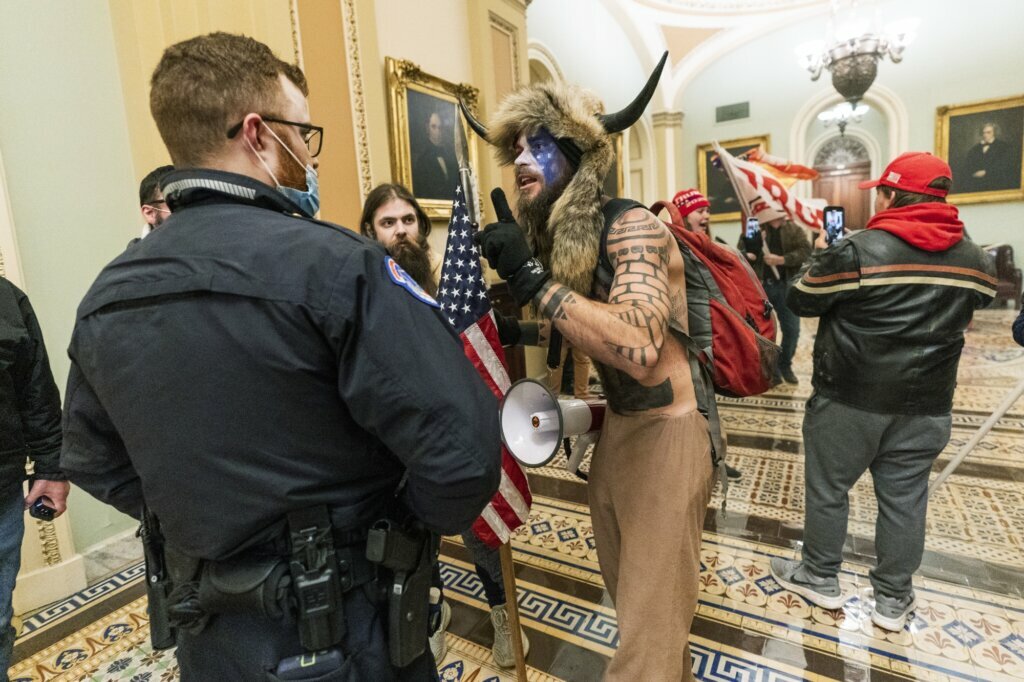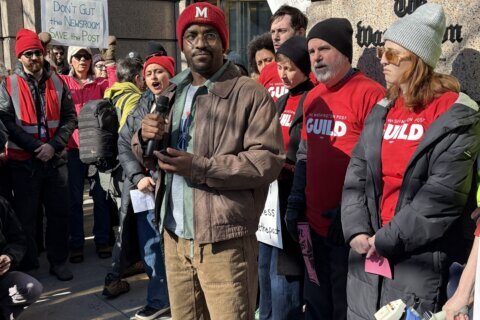
The top federal prosecutor in D.C. said Tuesday that his office is “looking at significant felony cases tied to sedition and conspiracy” related to the storming of the U.S. Capitol by mobs of President Donald Trump’s supporters last week.
Acting U.S. Attorney for D.C. Michael Sherwin said during a news conference that his office is launching a massive investigation into the riot and has formed a “strike force” of senior prosecutors focused on the sedition and conspiracy charges that relate “to the most heinous acts that occurred in the Capitol.”
Sedition is the legal term describing the overthrow or attempted overthrow of the government.
The strike force is made up of prosecutors with experience in national security and public corruption cases, and is operating like an international counterterrorism or counterintelligence operation, Sherwin said.
The team is investigating financial transactions, travel records, movement and communication records, he added.
So far, Sherwin said his office has already charged over 70 people who took part in the siege, including trespassing and theft of mail and digital devices. His office is also investigating theft of potential national security information and felony murder in the death of Capitol Police officer Brian Sicknick, who died after a confrontation with rioters.
Many of those charges are misdemeanors, Sherwin said, because prosecutors are focused on charging suspects quickly, which usually entails charging them with simpler offenses. Suspects can face mores serious charges when they’re indicted.
Sherwin said a federal grand jury in D.C. began meeting Monday. “It was booked throughout the entire day and for … hour upon hour, prosecutors in our office, significant felony cases,” he said.
Sherwin’s office will also focus on assaults on police officers and attacks on members of the media during the siege, which came as lawmakers inside were set to formally count Electoral College votes affirming President-elect Joe Biden’s victory in the 2020 presidential race.
“I think people are going to be shocked with some of the egregious conduct that happened within the Capitol,” Sherwin said, adding that some police officers were forced to defend themselves through “openhanded combat” with some of the rioters.
Sherwin was also asked if his office would consider domestic terrorism charges related to the planting of two pipe bombs at the headquarters of the Democratic National Committee and the Republican National Committee, both near the U.S. Capitol, on Jan. 6.
“I don’t like this tyranny of labels saying an act is domestic terrorism,” Sherwin said. “We have plenty of … federal charges to address all of this conduct.”
The pipe bombs were “real devices,” Sherwin said, with explosive igniters and timers. Investigators still aren’t sure why they didn’t explode before they were disabled and destroyed by the Capitol Police and Bureau of Alcohol, Tobacco, Firearms and Explosives, he added.
The FBI is offering a $50,000 reward for information about the pipe bomb suspect or suspects.
So far, investigators have received some 100,000 pieces of digital media of the Jan. 6 storming of the Capitol, and are scouring every piece for leads and are asking the public for more, said Steven D’Antuono, the assistant director in charge of the FBI’s Washington Field Office.
In the weeks leading up to the Jan. 6 rally, the FBI was aware that some people were planning to travel to the D.C. area “to cause violence,” he said. That information was shared with local authorities, he said, pointing to the arrest of Henry “Enrique” Tarrio, a leader in the far-right Proud Boys group, two days before the Capitol riot.
“The night before the rally, other individuals were identified in other parts of the country, and their travel subsequently disrupted,” D’Antuono added.
D’Antuono said the FBI shared threat information with local law enforcement, but that authorities have to separate actual threats from people “practicing keyboard bravado.”
Even for those who have left D.C., “agents from our local field offices will be knocking on your door,” D’Antuono said, highlighting the nationwide effort to track down participants in the rioting.
On Tuesday, The Washington Post first reported that the FBI had warned of a “war” at the Capitol in an internal report issued a day before the Jan. 6 attack, challenging earlier statements from law enforcement leaders who claimed they were unaware of more serious concerns.
D’Antuono defended the handling of the information, saying it was shared in 40 minutes with other law enforcement agencies.
Despite information about pro-Trump demonstrations in D.C., The Associated Press reported that Capitol Police did not bolster staffing and made no preparations for the possibility that protests could escalate into violent riots, according to several people briefed on the law enforcement response. Officials turned down help offered by the Pentagon three days before the riot.
When backup was finally requested, it took more than two hours for troops to mobilize near the Capitol. By then, the mob had raged inside for more than four hours.
The Associated Press and CNN contributed to this report.








